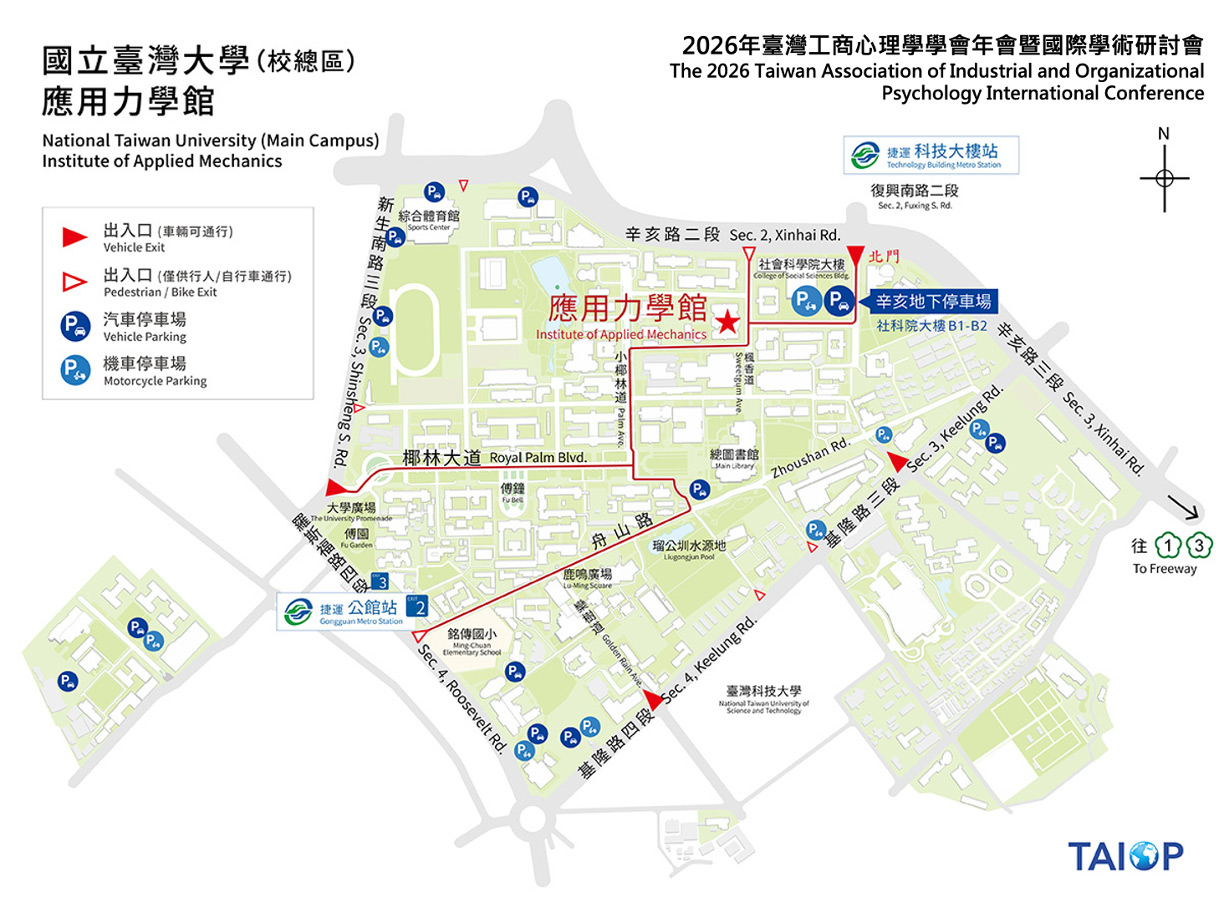跨越變動職場挑戰:凝聚「心」韌性
Overcoming Workplace Challenges: Building Psychological Resilience
會議時間 Dates
2026/5/16(六)、2026/5/17(日)
會議地點 Venue
國立臺灣大學
應用力學館
主辦單位 Organizer
社團法人臺灣工商心理學學會
國立政治大學企業永續管理研究中心
協辦單位 Co-organizer
國科會
國立臺北商業大學企業管理系
國立臺灣大學心理學系
國立國防大學心理及社會工作學系
國立政治大學心理學系
國立陽明交通大學經營管理研究所
中原大學心理學系
(以上學校單位依注音符號排序)
近年來,政治、經濟、科技、人口的快速變遷,全球的勞動環境出現前所未有的快速變動。中美貿易戰爭、關稅政策、生成式人工智慧的廣泛應用、年輕勞動力短缺、疫情後工作型態的改變等大環境因素,大幅轉變了工作的樣貌,也大幅增加職場的不確定性與挑戰。在此轉型的過程中,企業必須因應經濟環境、滿足市場需求並且推動企業轉型,在此同時,員工也需要學習適應新環境、扮演新角色與培養新技能。在此變動的時代,企業除了必須正視員工在轉型過程中承受的心理壓力與焦慮,更需要思考如何協助員工不確定的工作環境中調適壓力,以繼續投入工作且達到身心平衡。這個議題顯然成為全球組織與社會共同關注的重要課題。
不管是企業或是個人,都需要長期面對一個不穩定(Volatile)、不確定(Uncertain)、複雜(Complex)、和模糊(Ambiguous) VUCA狀態之外在環境,並且能根據環境調整自身狀態,以適應環境,也就是需要具備韌性(resilience),方能有效應對未來的環境。美國心理學會(American Psychological Association)將韌性定義為根據外在與內在需求,特別是透過心理、情緒與行為的彈性調適,成功適應艱難或具挑戰性生活經驗的過程與結果(The process and outcome of successfully adapting to difficult or challenging life experiences, especially through mental, emotional, and behavioral flexibility and adjustment to external and internal demands)。美國心理學會官方網站中,並針對韌性此主題的專門網頁,定期更新相關議題與Podcast。由此可見,協助員工建立韌性,是企業面對VUCA環境的重要活動。
許多跨國企業在推動永續發展時,也積極將員工的心理健康、福祉與工作韌性納入策略規劃。例如,美國與歐洲的企業普遍設置員工協助方案(Employee Assistance Program, EAP),透過心理健康支持、壓力管理課程及資源網絡,協助員工培育心理韌性,以因應工作中持續出現的挑戰。亞洲地區的企業則強調建立友善職場文化,將心理健康與員工支持機制納入人才發展政策,協助員工在轉型過程中獲得安全感與歸屬感。這些實踐經驗皆顯示出提升員工心理韌性不僅是個人層面的需求,亦是組織永續競爭力的重要基石。
以我國為例,自1994年起,勞動部開始推動EAP相關計畫,歷經四個階段推行。在2003年之後,更持續因應經濟社會狀況,啟動企業EAPs的宣導與推動計畫。
然而,近年來台灣面臨的挑戰更甚,少子化、人口老化以及人才外流的挑戰,使企業在人力資源招募與留任方面面臨困境。同時長工時文化與職場高壓環境,使員工承受相對更大的心理負荷。而數位轉型與產業升級帶來的技能需求變化,也使許多員工必須不斷調整與學習,以避免被新時代淘汰。在此背景下,EAPs這種較為支持性的計畫已經不足以因應這種快速變動的環境。因此,企業更需要協助員工培育心理韌性的措施,以避免員工因為倦怠與不確定性等問題,影響其身心健康與工作表現甚至離職,進而降低組織整體的生產力與創新力。
據上所述,本研討會以「跨越變動職場挑戰:凝聚『心』韌性」為主題,旨在回應當前社會與產業所面臨的重大挑戰,並凸顯心理資源與心理韌性在現代職場的重要性。希冀提供一個學術與實務的交流與討論的平台,凝聚跨界智慧,提出切實可行的建議與方案,協助臺灣企業在面對職場挑戰時,培育出更具心理韌性的員工群體,進而提升組織的永續發展能力。
The theme of the 2026 TAIOP Conference, “Overcoming Workplace Challenges: Building Psychological Resilience,” addresses one of the most urgent issues facing today’s global workforce. Rapid shifts in geopolitics, economics, technology, and demographics have fundamentally changed how organizations operate. New pressures, including fluctuating tariff policies and shrinking youth labor populations, require companies to adapt continuously and innovate at unprecedented speeds. Meanwhile, employees must take on new roles, adjust to changing work environments, and develop the skills needed for a workplace in constant flux. Psychological resilience has thus become a strategic necessity for both organizations and individuals.
Resilience, as defined by the American Psychological Association (APA), is “the process and outcome of successfully adapting to difficult or challenging life experiences, especially through mental, emotional, and behavioral flexibility.” Organizations worldwide are increasingly investing in this adaptive capacity. Common approaches include Employee Assistance Programs (EAPs), stress management interventions, and integrating mental health resources into human resource management systems. These initiatives reflect a critical recognition: employee resilience has become a foundation of organizational sustainability, agility, and long-term competitiveness.
This priority is especially urgent in Taiwan, which faces a declining birth rate, rapid population aging, and ongoing talent outflow, all of which intensify challenges in workforce retention and recruitment. Additionally, Taiwan’s culture of long working hours and high-pressure environments significantly increases employees’ mental and emotional strain. As industries undergo digital transformation and technological upgrades, workers face greater pressure to continuously acquire new skills. Under these conditions, traditional EAP models alone are not enough. Organizations must adopt more comprehensive and forward-looking strategies to boost employees’ psychological resilience and reduce burnout, anxiety, and turnover—issues that directly threaten productivity, innovation, and national competitiveness.
In response to these challenges, the 2026 TAIOP Conference aims to provide a crucial platform for academic–practitioner dialogue and interdisciplinary exchange. We invite researchers and practitioners to submit abstracts that present diverse perspectives, empirical findings, innovative practices, and actionable strategies related to psychological resilience in the workplace. Through collaborative insights and shared expertise, this conference seeks to help organizations in Taiwan and around the world develop resilient workforces and strengthen their capacity for sustainable growth amid ongoing uncertainty.
歡迎因應年度主題「跨越變動職場挑戰:凝聚『心』韌性」,或是工商心理學、人力資源管理、組織行為學等相關領域的研究議題,踴躍投稿!
-
投稿時間:即日起~2026/3/15(日)17:00 截止。
-
投稿規範:
1. 接受中、英文投稿;惟每人參與之稿件以三篇為限(中、英文合併計算)
2. 中文稿件標題字數限制50字以內,摘要限制500字以內;需以中文報告
3. 英文稿件標題限制150字元以內,摘要限制2000字元以內;需以英文報告
【日後公佈,敬請稍候。】
【日後公佈,敬請稍候。】

捷絲旅臺大尊賢館 / Just Sleep Taipei NTU
”「捷絲旅臺大尊賢館」位於國立台灣大學旁,提供至校園教學、實習、研究、學術交流、會議及參訪人員舒適旅宿的選擇,館內將自在的學院風格融入設計中,營造與校園共榮的氛圍。
Just Sleep Taipei NTU is located beside the National Taiwan University. It offers a comfortable accommodation choice for those people who go teaching, interning, researching, academic communication, meeting and touring. The hotel mixes the design of free college style to create an atmosphere of mutual prosperity with the campus.
地址/Address:台北市大安區羅斯福路四段83號
No. 83, Sec. 4, Roosevelt Rd., Taipei 10673, Taiwan
電話/Tel:+886 2 7735 5088
會館地址:台北市大安區羅斯福路四段83號
捷運:
搭乘捷運至松山新店線公館站2號出口,步行約2分鐘即可到達飯店。
自行開車:
國道一號:於圓山交流道連接建國高架橋→直行下交流道左轉辛亥路二段→右轉基隆路(行駛平面道路)→右轉羅斯福路四段→直行約300公尺即抵達。
國道三號:於木柵交流道連接進國道三甲(台北聯絡線)→下交流道連接辛亥路三段→左轉基隆路(行駛平面道路)→右轉羅斯福路四段→直行約300公尺即抵達。
如何前往捷絲旅台大尊賢會館
搭乘捷運至松山新店線公館站2號出口,步行約2分鐘即可到達捷絲旅台大尊賢會館。
更多交通資訊請參考:http://www.justsleep.com.tw/NTU/zh/location
如何前往會議場地

開車
- 國道1號由建國南路交流道下,走高架往南至辛亥路出口下,靠右行駛慢車道往木柵方向,至復興南路口右轉進入臺大辛亥路大門。
- 國道3號由20.8公里木柵交流道下往台北方向,接國3甲線至辛亥路,穿過基隆路車行地下道後靠右慢車道行駛至復興南路口,左邊即臺大辛亥路大門。
停車資訊
-
校園停車格 30元/30分鐘
-
辛亥地下停車場(入口:進辛亥路校門柵欄前右側,出口:辛亥路2段)
汽車:20元/30分鐘;
機車:20元/次
如何上高速公路
-
國道1號:由臺大辛亥路大門,左轉辛亥路上建國高架道。
-
國道3號:出臺大辛亥路大門,右轉辛亥路接國3甲聯絡道。
捷運
- 捷運新店線:公館站2號出口,沿舟山路過圖書館左轉,步行約13分鐘。
- 捷運文湖線:科技大樓站,沿復興南路往南走約600公尺由辛亥路校門進入後第一個路口右轉。
公車
- 臺大資訊大樓站
298、懷恩S31(於捷運公館站3號出口搭乘) - 羅斯福路公館站
30、653、74、254、278、643、644、252、251、236、 606、
291、208、1、510、253、907。 - 新生南路臺大站
642、290、505、907、284、253、52、280、311、○南,由西側門進入台大。 - 和平東路復興南路口站
3、72、74、18、52、211、235、284、237、278、15、209、295、626、和平幹線、敦化幹線。